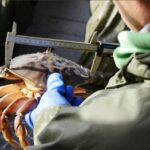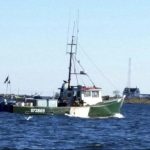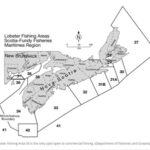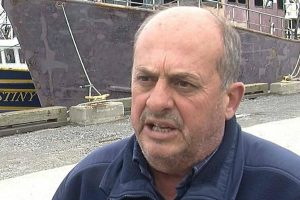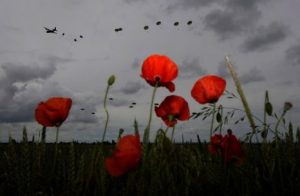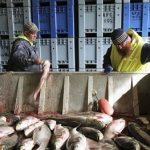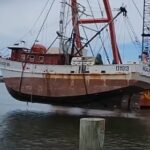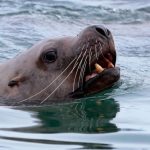Tag Archives: Jeff Kaelin

‘Tragedy of the Commons’ Will be the Fate of Marine Environment in Atlantic Offshore Wind Farms
Like the English commons, the Atlantic waters could take just so much ‘grazing’. The Canadian government finally recognized the cod fishery had crashed and closed it;,, Recognizing that fish could not be owned until they were caught, government regulators attempted to at least partially privatize fishing rights. So too, the waters in which they swim (Hague Line dividing CN and US waters in the Gulf of Maine and on Georges Bank.) It was that bottom and those waters that wind farm builders wanted “rights”.,,, So, the question arises “why don’t the fishing interests move to protect these sensitive marine habitats?” They have tried without much success. >click to read< 18:43

Fishing industry unimpressed with Biden Harris’s NOAA/NMFS climate crisis notions. (Offshore Wind Farms, either!)
President Biden ordered NOAA to collect information from a wide range of groups on increasing the resilience of fisheries as part of his plan to address climate change and to protect 30% of U.S. ocean areas by the year 2030. The NOAA directive is included in the sweeping executive order Biden signed his first week in office that made “the climate crisis” a centerpiece of his presidency. “Fisheries, protected resources, habitats and ecosystem are being affected by climate change,” acting NOAA Fisheries chief Paul Doremus said at the beginning of yesterday’s conference call. >click to read< 07:55
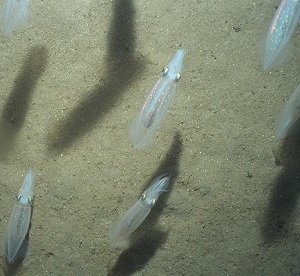
Squid Fishery Responsible for Over 2,500 Jobs, $240 Million in Economic Impact in New England and Mid-Atlantic region
Fishing for longfin squid brings in tens of millions of dollars in annual revenue and supports thousands of full-time jobs, according to a new study from the Science Center for Marine Fisheries (SCEMFIS). “Loligo squid is a significant part of our business and is also a Marine Stewardship Council-certified, sustainable fishery with its products in demand in the U.S., Europe and Asia,” said Jeff Kaelin, Director of Sustainability and Government Relations for Lund’s Fisheries, in Cape May, New Jersey. “This study shows the extent to which our fishery has grown in size and economic importance, which needs to be considered by both fishery and wind-energy regulators making decisions impacting our future.” >click to read< 16:44
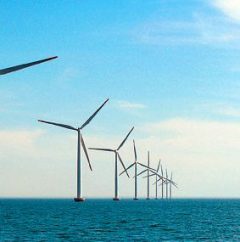
Offshore Wind Farm: Clean, Green…Profitable?
In most lifetimes, there are only a few chances to participate in the birth of an industry,,, Ohleth is the senior manager for stakeholder engagement of Orsted, the Danish energy firm that has the contract to build Ocean Wind,,, According to Ohleth, big opportunities are on the way. Not everyone was as sanguine about the proposal. Jeff Kaelin, of Lunds Fisheries, presented a slide that showed the overlap of the project area for Ocean Wind with the path of fishing boats in the region. “The clam guys fish inside of there,” Kaelin stated that the fishing industry would face a disproportionate impact from the wind energy proposal. He described commercial fishing as a $6-billion industry that employs about 30,000 people in a half-dozen different ports, including the Lunds facility, near the Middle Thorofare Bridge, just in from Cape May Inlet. >click to read< 17:27
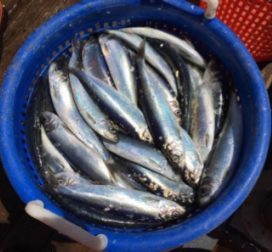
This summer crisis could take the steam
This year federal authorities are imposing a steep reduction, and a few regions of the East Coast are restricted to fishing, months prior to the lobster season gets rolling. East Coast herring fishermen brought over 200 million pounds of these fish to docks lately as 2014, but the catch of this year will be limited to less than a fifth of that total. The cut scrambling for fresh lure sources, is leaving with herring for generations in Maine lobstermen, who have baited traps and concerned about their capacity to find lobster. >click to read< 12:40
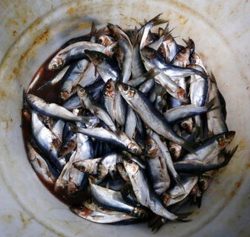
Bait crisis could take the steam out of lobster this summer
Members of the lobster business fear a looming bait crisis could disrupt the industry during a time when lobsters are as plentiful, valuable and in demand as ever. America’s lobster catch has climbed this decade, especially in Maine, but the fishery is dependent on herring,,, The loss of herring is also a heavy blow to the fishermen who harvest the species, said Jeff Kaelin, who works in government relations for Lund’s Fisheries, a herring harvester based in Cape May, New Jersey. >click to read<13:18
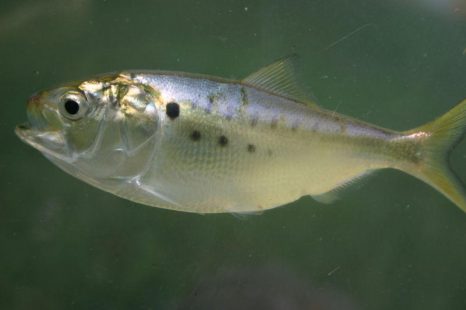
Environmentalists Are Wrong About Menhaden Fishery
Fishing companies are at odds with Rhode Island environmental advocacy groups over proposed changes for the menhaden fishing industry, Changes to the Interstate Fishery Management Plan for Atlantic Menhaden are up for a vote at the Atlantic States Marine Fisheries Commission meeting in Maryland this Monday and Tuesday. Meghan Lapp, fishery liaison for the Rhode Island-based Seafreeze Ltd, said that temporary plan shouldn’t be implemented because it’s based off of science that isn’t applicable to menhaden. click here to read the story 12:19
Decision coming Monday on Menhaden management
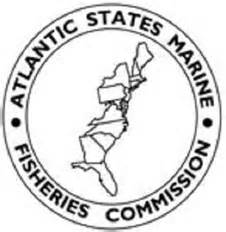 The Atlantic States Marine Fisheries Commission will decide on a new management plan for Atlantic menhaden at a meeting near Baltimore on Monday. Fishermen and environmentalists have a lot riding on how much of the resource is set aside for fishing, and how much is left for wildlife predators. Known as Amendment 3, the new rule will set the future course for managing the forage fish species eaten by many other fish, birds like osprey, dolphins and whales. click here to read the story Atlantic Menhaden Management Board – The Board will meet to consider approval of Amendment 3 to the Interstate Fishery Management Plan for Atlantic Menhaden. click here to read 3 sets of meeting materials 10:35
The Atlantic States Marine Fisheries Commission will decide on a new management plan for Atlantic menhaden at a meeting near Baltimore on Monday. Fishermen and environmentalists have a lot riding on how much of the resource is set aside for fishing, and how much is left for wildlife predators. Known as Amendment 3, the new rule will set the future course for managing the forage fish species eaten by many other fish, birds like osprey, dolphins and whales. click here to read the story Atlantic Menhaden Management Board – The Board will meet to consider approval of Amendment 3 to the Interstate Fishery Management Plan for Atlantic Menhaden. click here to read 3 sets of meeting materials 10:35
Oversight Hearing “Exploring the Successes and Challenges of the Magnuson-Stevens Act” Wednesday, July 19, 2017 2:00 PM
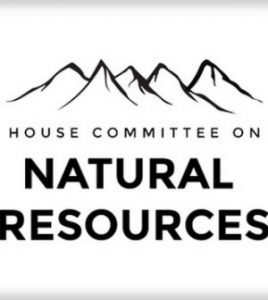 On Wednesday, July 19, 2017, at 2:00 p.m., in Room 1324 Longworth House Office Building, the Subcommittee on Water, Power and Oceans will hold an oversight hearing titled “Exploring the Successes and Challenges of the Magnuson-Stevens Act.” Witnesses are Mr. Jeff Kaelin, Government Relations, Lund’s Fisheries, Inc. Cape May, New Jersey. Mr. Sean Martin, President, Hawaii Longline Association, Honolulu, Hawaii. Mr. Nick Wiley, Executive Director, Florida Fish and Wildlife Conservation Commission, Tallahassee, Florida. Mr. Charles Witek, Recreational Angler and Outdoor Writer, West Babylon, New York. click here at 14:00 Wednesday to watch the proceeding. If you need further information, please contact Calvin Frauenfelder, Clerk, Subcommittee on Water, Power and Oceans at (202) 225-8331.
On Wednesday, July 19, 2017, at 2:00 p.m., in Room 1324 Longworth House Office Building, the Subcommittee on Water, Power and Oceans will hold an oversight hearing titled “Exploring the Successes and Challenges of the Magnuson-Stevens Act.” Witnesses are Mr. Jeff Kaelin, Government Relations, Lund’s Fisheries, Inc. Cape May, New Jersey. Mr. Sean Martin, President, Hawaii Longline Association, Honolulu, Hawaii. Mr. Nick Wiley, Executive Director, Florida Fish and Wildlife Conservation Commission, Tallahassee, Florida. Mr. Charles Witek, Recreational Angler and Outdoor Writer, West Babylon, New York. click here at 14:00 Wednesday to watch the proceeding. If you need further information, please contact Calvin Frauenfelder, Clerk, Subcommittee on Water, Power and Oceans at (202) 225-8331.
Hearing Memorandum details, click here 19:35
A Hudson Canyon-sized power struggle is developing 100 miles off N.J.’s coast
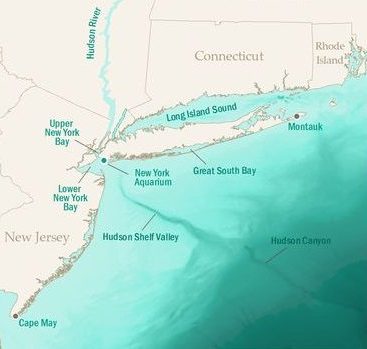 In November 2016, the Wildlife Conservation Society nominated Hudson Canyon to be designated a National Marine Sanctuary. The WCS selected the canyon, the largest submarine crevice on the Atlantic Coast, due to its wide biodiversity. The canyon is home to more than 20 protected species, including the North Atlantic right whale, according to the conservation group. “This is a canyon the scale of the Grand Canyon,” said Jon Forrest Dohlin, the Vice President of the WCS and the director of the New York Aquarium. “It seemed like something that could really benefit from awareness and protection.” But commercial fishermen see this as the latest in a series of moves that could lead to increased fishing restrictions from the Gulf of Maine to the Gulf of Mexico. Commercial fishermen in New Jersey fear losing access to a profitable fishing ground. According the Greg DiDomenico, the executive director of the Garden State Seafood Association, click here to read the story 09:54
In November 2016, the Wildlife Conservation Society nominated Hudson Canyon to be designated a National Marine Sanctuary. The WCS selected the canyon, the largest submarine crevice on the Atlantic Coast, due to its wide biodiversity. The canyon is home to more than 20 protected species, including the North Atlantic right whale, according to the conservation group. “This is a canyon the scale of the Grand Canyon,” said Jon Forrest Dohlin, the Vice President of the WCS and the director of the New York Aquarium. “It seemed like something that could really benefit from awareness and protection.” But commercial fishermen see this as the latest in a series of moves that could lead to increased fishing restrictions from the Gulf of Maine to the Gulf of Mexico. Commercial fishermen in New Jersey fear losing access to a profitable fishing ground. According the Greg DiDomenico, the executive director of the Garden State Seafood Association, click here to read the story 09:54
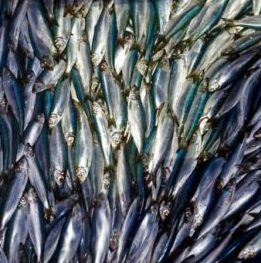
Drop in herring a mystery in Maine as bait price booms
Scientists and fishermen are trying to figure out why Maine’s Atlantic herring catch — the largest in the nation — has fallen from 103.5 million pounds in 2014 to 77.2 million last year. The per-pound price of the fish at the dock has gone up 56 percent since 2014, and that price is eventually borne by people who buy lobsters. “The whole dynamic of the fishery has changed,” said Jeff Kaelin, who works in government relations for Lund’s Fisheries, which lands herring in Maine. Kaelin, and others who work in and study the fishery, thinks climate and the way the government manages herring may have played a role in the decline of catch. Atlantic herring are managed via a quota system, and regulators have slashed the quota by more than 40 percent since the early 2000s. Last year, herring were also difficult to catch far offshore, where they are typically caught in large amounts, but they were abundant closer to the New England coast. This led to a bait shortage, because fishermen are only allowed to catch a certain percentage of their quotas in inshore waters. Read the story here 10:15
The real reason why you’re suddenly seeing whales in N.J. and N.Y. waters
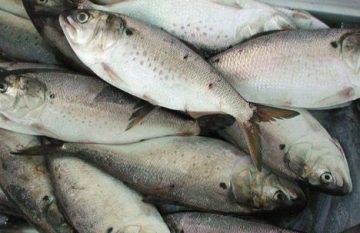 Whales. They’ve been seemingly everywhere. Breaching just past the sandbars in Asbury Park. Swimming past groups of surfers in Rockaway Beach. Besides inspiring a chorus of oohs and aahs, the increase in sightings is adding a blubbery new wrinkle to a raging debate over a far smaller fish: the Atlantic menhaden. It’s the menhaden, also known as “bunker” — clumsy, multidinous, slow swimming virtual floating hamburgers — that those whales are chasing. But the story of why Atlantic menhaden is suddenly so plentiful is a complicated — and controversial — one, pitting environmentalists and anglers against commercial fishing operations, with both sides claiming science is on their side. Read the story here 12:33
Whales. They’ve been seemingly everywhere. Breaching just past the sandbars in Asbury Park. Swimming past groups of surfers in Rockaway Beach. Besides inspiring a chorus of oohs and aahs, the increase in sightings is adding a blubbery new wrinkle to a raging debate over a far smaller fish: the Atlantic menhaden. It’s the menhaden, also known as “bunker” — clumsy, multidinous, slow swimming virtual floating hamburgers — that those whales are chasing. But the story of why Atlantic menhaden is suddenly so plentiful is a complicated — and controversial — one, pitting environmentalists and anglers against commercial fishing operations, with both sides claiming science is on their side. Read the story here 12:33
KAELIN: Fisheries commission should increase menhaden quota
 When Thanksgiving rolls around this year, the Atlantic States Marine Fisheries Commission may give New Jersey’s fishermen something to be thankful for. At its meeting Wednesday, the ASMFC will be voting on whether to increase the number of menhaden fishermen can catch each year. By voting in favor of a quota increase, which is strongly supported by the science New Jersey’s commission representatives can improve local economies and bolster the bottom line of hard-working fishermen during the summer and fall seasons while maintaining a balanced ocean ecosystem. After the release of a periodic stock assessment in 2012, the ASMFC incorrectly concluded the stock was threatened. The commission followed that assessment with a significant cut in the amount of menhaden New Jersey fishermen were allowed to catch — a cut of more than 50 percent that remains in effect today, much to the detriment of New Jersey fishing businesses. Read the story here 19:57
When Thanksgiving rolls around this year, the Atlantic States Marine Fisheries Commission may give New Jersey’s fishermen something to be thankful for. At its meeting Wednesday, the ASMFC will be voting on whether to increase the number of menhaden fishermen can catch each year. By voting in favor of a quota increase, which is strongly supported by the science New Jersey’s commission representatives can improve local economies and bolster the bottom line of hard-working fishermen during the summer and fall seasons while maintaining a balanced ocean ecosystem. After the release of a periodic stock assessment in 2012, the ASMFC incorrectly concluded the stock was threatened. The commission followed that assessment with a significant cut in the amount of menhaden New Jersey fishermen were allowed to catch — a cut of more than 50 percent that remains in effect today, much to the detriment of New Jersey fishing businesses. Read the story here 19:57
Changing Migration Patterns Upend East Coast Fishing Industry
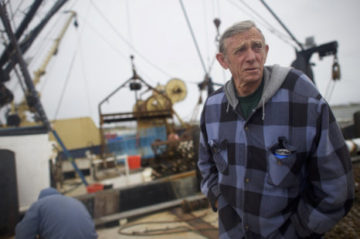 Summer flounder that once amassed in North Carolina have gradually shifted about 140 miles to New Jersey—one facet of the northward migration of fish species that is upending traditional fishing patterns. The move north has sparked debate among regulators over how to respond to changing natural resources that could affect commercial fisheries across the eastern seaboard. For the first time, a group of researchers backed by the federal government is trying to ascertain what the northward movement means for fishermen’s income and way of life. “Some fisherman will end up losing out and some will win big,” Read the rest here 13:04
Summer flounder that once amassed in North Carolina have gradually shifted about 140 miles to New Jersey—one facet of the northward migration of fish species that is upending traditional fishing patterns. The move north has sparked debate among regulators over how to respond to changing natural resources that could affect commercial fisheries across the eastern seaboard. For the first time, a group of researchers backed by the federal government is trying to ascertain what the northward movement means for fishermen’s income and way of life. “Some fisherman will end up losing out and some will win big,” Read the rest here 13:04
Uncivil War Brews Over Summer Flounder as Waters Warm
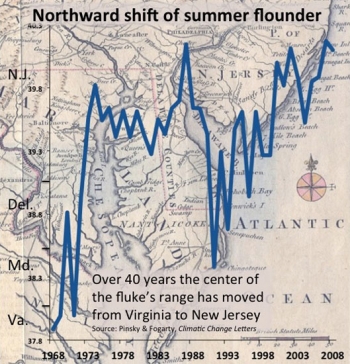 The summer flounder – one of the most sought-after catches on the U.S. East Coast – is stirring up a climate change battle as it glides through the sand and grasses at the bottom of a warming North Atlantic. Some scientists say in recent years the species has begun adapting in another way. As the Atlantic Ocean has warmed, they say, the fish have headed north. (like codfish? yellow tail flounder? hmm?) Read more here 10:05
The summer flounder – one of the most sought-after catches on the U.S. East Coast – is stirring up a climate change battle as it glides through the sand and grasses at the bottom of a warming North Atlantic. Some scientists say in recent years the species has begun adapting in another way. As the Atlantic Ocean has warmed, they say, the fish have headed north. (like codfish? yellow tail flounder? hmm?) Read more here 10:05
Herring fishermen lose on higher haddock bycatch limit
Herring fishermen are struggling to avoid haddock because the stock on Georges Bank is increasing, said Tooley, who also is a council member but recused herself from Thursday’s vote. At the same time, federal regulators have lowered the cap for haddock bycatch from previous years, she said. “The biomass has gone up and the cap has gone down. That’s the problem,” she said. Read more here 11:12
Herring and haddock fishermen at odds over bycatch
Fishermen in two of the most lucrative fisheries in the Northeast — Atlantic herring and haddock —are at odds over the management of fishing in Georges Bank, a key nerve center for both species. Atlantic herring fishermen who fish from mid-water trawl boats are on track this year to exceed their limit for incidental catch of haddock in Georges Bank, off the coast of New England, federal regulators said. That would trigger rules that would effectively shut down the herring fishery. Read more here 11:39

































